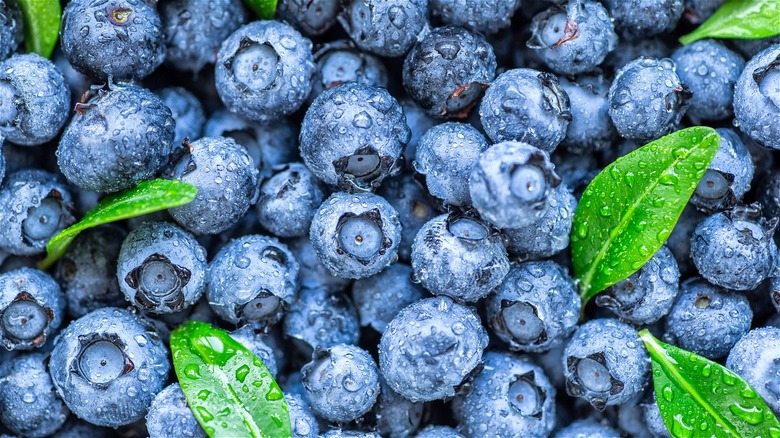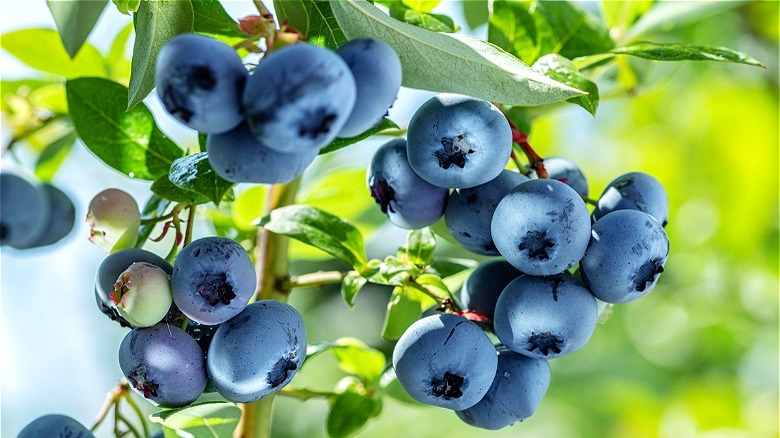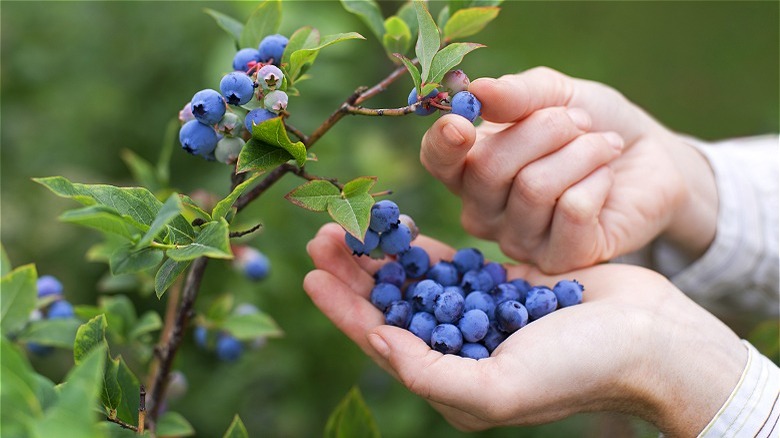Which U.S. State Produces The Most Blueberries?
If you consider yourself a fruit lover, you probably can't name many foods that surpass the flavor of freshly picked blueberries during those warm summer months. You may live in a high-production state and can benefit from the seasonal "you-pick" stands or like many, have to settle for the next best thing and buy blueberries in season at your nearest supermarket. Regardless of which way you procure your daily dose of berries, according to the U.S. Highbush Blueberry Council, these round, deep-hued berries are indigenous to North America and have been growing in the U.S. for over 10,000 years. In present-day America, the USDA claims blueberries are the second most cultivated berry in our nation.
In addition to the subtly sweet flavor of these small, tart orbs, the Cleveland Clinic outlines the many health benefits that come with adequate blueberry consumption. Not only do blueberries have high levels of antioxidants but they're rich in vitamins C and K and can aid the human body in managing blood sugar and cholesterol. At the end of the day though, who can say no to a double cherry berry pie? With blueberries being so popular in America, you can safely assume the U.S. produces the most berries apart from any other country in the world, via USDA. Yet, out of all 50 options, which state produces the most?
Head west for the most blueberries
Even though BC Blueberries claims just one blueberry bush can produce over 5,000 berries in one year, according to the University of Florida, the U.S. picked 774.1 billion pounds of these popular berries in 2021 alone. If you're surprised by the sheer number of berries grown and harvested in our nation every year, there is actually one state that trumps the rest when it comes to blueberry production.
If you're looking to test all the 11 ways to use blueberries, then you may need to take a trip to Washington state. AgHires claims Washington produces the most blueberries every year, harvesting an impressive 160 million pounds in 2019 alone. The Produce News showcases how 2022 was predicted to be the best growing year to date: The northwestern state was expected to produce 180 million pounds of blueberries, typically growing 85% organic, with a comparable split between fresh and frozen berries. Washington's blueberry season tends to run longer than most other states due to sustainable weather. In this mass-producing state, the blueberry season lasts from June to October, per The Produce News. Yet what makes Washington the ideal place to grow blueberries? While the Pacific Northwest may produce most of these individual superfoods, there are other U.S. states that also produce a significant amount of blueberries.
Tepid weather and proper soil are blueberry-growing essentials
According to AgriBusiness Trading Group, Washington blueberries grow in the western part of the state but also in the east, where little precipitation breeds fewer pests. Executive director of the Washington Blueberry Commission in Eltopia, Alan Schreiber, told The Spokesman-Review that since the state expanded its growing capacity they now have a "five-month picking window" where berries in the west are harvested later while the ones in the east are harvested in June before temperatures cool down. This positions Washington to produce the most berries, not just by sheer volume but because of the state's acidic soil which is ideal for blueberry plant growth, via AgriBusiness Trading Group.
Washington is not the only mass-producing state in America either. AgHires claims Oregon, Michigan, and New Jersey are some of the other top producers of blueberries. A solid amount of blueberries are grown in none other than the Pine Barrens of southern New Jersey due to the ground's acidic soil conditions, via Jersey's Best. Anthony DiMeo of DiMeo Farms in Hammonton, NJ partially attributes their growing success to the sandy makeup and low pH of the Pine Barren soil. Regardless of where you procure your blueberries, their subtle sweetness makes them a convenient snack or the perfect addition to your favorite blueberry muffins. If you're longing for ample freedom to pick your own blueberries, however, you may want to head to Washington, or one of the other top-producing states in the U.S.


